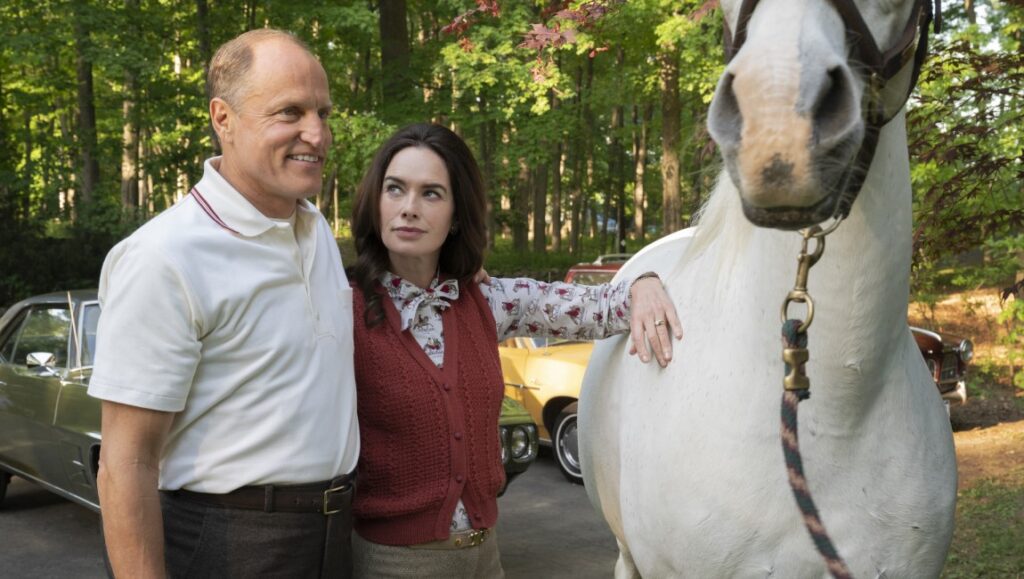When VEEP aired on HBO eleven years ago, it seemed easy to call it a vicious political satire. The show was at its best when it delighted in mocking the narcissism and incorrigible despicability of American politicians, and it had an impeccable knack for crude, comedic dialogue that’s rare in most TV nowadays. Compared to idealistic political dramas like West Wing or Madam Secretary, VEEP stood out because it portrayed Washington as a bottomless pit of buffoonery, and because it refused to offer its characters the grace of redemption. Created by VEEP writers Alex Gregory and Peter Huyck and directed by David Mandel — the showrunner for VEEP, after Armando Iannucci’s departure — White House Plumbers replicates the tragicomic tone of VEEP with some success, right down to Justin Theroux’s thick, glaringly fake-looking mustache. Narratively, the latest limited series by HBO is another media re-enactment of the Watergate scandal, a political event so belief-defying that it simply needs to be retold over and again so that the American public is properly reminded that it did, indeed, happen. (There was another prestige series on the scandal, called Gaslit, that aired just last year.)
Despite its centering around an overcovered topic, White House Plumbers manages to capture the absurdity of the Nixon administration in a novel way; unlike other narratives written about this scandal, Gregory and Huyck’s script is more concerned with the agents of espionage and the process of the break-in than the repercussions that came afterward. Through its farcical dramatization, the new series gets one thing right about Watergate: this heist simply wasn’t the stuff of Ocean’s Eleven, and neither were the people who were placed in charge of it. White House Plumbers wants to make sure we know that G. Gordon Liddy and Howard Hunt had proper practice leading up to the actual scandal — like stealing Daniel Ellsberg’s psychiatric file, which is depicted in the series — and still, they fucked up by getting caught.
White House Plumbers is told from the viewpoints of these two key political players and partners — Theroux taking on the role of Liddy alongside Woody Harrelson as Hunt. The former’s impression of Liddy renders the man almost preposterous and profoundly trapped within his own self-importance, which perfectly aligns with the show’s message of the cruel mediocrity of the American government. Indeed, it’s not at all hard to see how Theroux’s version of Liddy could easily reflect any number of politicians in our present — and yes, that even includes the part where Liddy puts on Hitler’s speeches as background dinner music. (It’s rumored that the real Liddy burst into the Nazi anthem when he entered prison.) This level of archness works thanks to Theroux’s pitch-perfect performance, a turn that showcases his versatility across genres — his previous appearance in an HBO project was The Leftovers, which was about as somber and bleak as prestige TV gets.
As the partner who is embarrassed by Liddy’s ludicrous antics, Harrelson’s impression of Hunt is slightly more grounded, and while this works to level out the show’s satiric bite, it can also sometimes feel mismatched with the film’s intended tenor. It’s unclear what Gregory and Hyuck intend with this fictional portrayal of Hunt, who is arguably the most well-rounded character in White House Plumbers; he has a wife, many children, and his own family drama concerning the woes of fatherhood. Hunt’s wife, Dorothy (Lena Headey), is exasperated whenever he leaves the parenting duties to her, and it’s obvious she is the more competent of the two (she’s also a former intelligence operative). During these scenes, it’s almost as if White House Plumbers aspires to be a family drama and deliver social commentary on unequal gender roles. But the depth of that subplot is sacrificed in favor of the avowed political farce to which the series whole-heartedly commits. It’s also worth questioning if the commentary on gender roles is necessary or shrewd given the context of Dorothy Hunt’s possible involvement in the cover-up of the Watergate scandal. The use of Lena Headey’s talents feels especially wasted here: she gives a terrific performance as a woman who’s had enough of her sexist and incompetent husband, but her role at the same time remains largely unwritten.
Nevertheless, for a scandal that has already been documented in every format imaginable, White House Plumbers excels in keeping suspense up in anticipation of the inevitable failure of Liddy and Hunt’s operation. This is made possible through the series’ astute parody of the heist genre: the audience is taken through the duo’s attempts to garner support for the ridiculous idea, their planning of the break-in, and the endless failures, as well as the consequent exposure. The contrast between dutifully following the heist genre’s predictable beats and the jarring satire that underpins all of Liddy’s and Hunt’s actions, makes the sheer incompetence of the entire scandal all the more pronounced and foolish in retrospect. It’s as such that White House Plumbers wonderfully nails the strange mix of tragicomedy and farce that defined the Nixon administration — the entire presidency was brought down, as Nixon has said, by “a comedy of errors.” There’s certainly a debate to be had about our need for more Watergate media after so many go-rounds, but this particular return to the well thankfully works like a charm.
Published as part of InRO Weekly — Volume 1, Issue 19.


Comments are closed.